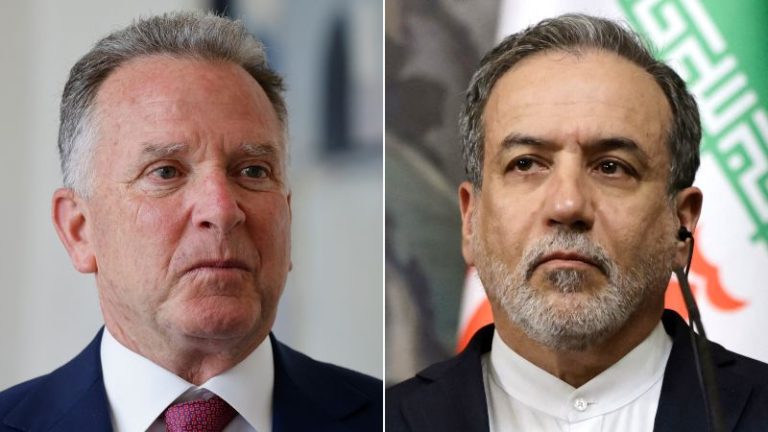President Donald Trump defended the U.S. preparing to accept a jumbo jet gift from Qatar’s royal family to serve as a temporary Air Force One as Boeing failed to roll out a new Air Force One fleet in a timely manner.
‘We’re very disappointed that it’s taking Boeing so long to build a new Air Force One,’ Trump said during a press conference on drug prices Monday morning. ‘You know, we have an Air Force One that’s 40 years old. And if you take a look at that, compared to the new plane of the equivalent, you know, stature at the time, it’s not even the same ballgame.’
‘When I first came in, I signed an order to get (the new Air Force One fleet) built,’ he continued. ‘I took it over from the Obama administration, they had originally agreed. I got the price down much lower. And then, when the election didn’t exactly work out the way that it should have, a lot of work was not done on the plane because a lot of people didn’t know they made change orders. That was so stupid, so ridiculous. And it ended up being a total mess, a real mess.’
Reports spread Sunday morning that the Trump administration was expected to accept a $400 million Boeing 747-8 jumbo jet from Qatar’s royal family. ABC News reported that Trump would use the jet until the end of his term, when it would be given to his presidential library.
Trump confirmed Sunday evening on Truth Social that the Department of Defense would receive the 747 as a gift, while railing against Democrats as ‘world class losers’ for criticizing the gift.
‘So the fact that the Defense Department is getting a GIFT, FREE OF CHARGE, of a 747 aircraft to replace the 40 year old Air Force One, temporarily, in a very public and transparent transaction, so bothers the Crooked Democrats that they insist we pay, TOP DOLLAR, for the plane,’ Trump wrote. ‘Anybody can do that! The Dems are World Class Losers!!! MAGA.’
He continued in the press conference Monday that when he returned to office in January, his administration informed him construction on two new Air Force Ones was ‘way behind’ on the schedule for completion.
‘If we can get a 747 as a contribution to our Defense Department to use during a couple of years while they’re building the other ones. I think that was a very nice gesture. Now, I could be a stupid person to say, ‘Oh, no, we don’t want a free plane.’ We give free things, we’ll take one, two, and it helps us out. Because again, we’re talking about we have a 40-year-old aircraft. The money we spend, the maintenance we spend on those planes to keep them tippy-top is astronomical,’ he added, calling the gift a ‘great gesture from Qatar.’
White House press secretary Karoline Leavitt also brushed off concern over the Qatari royal family donating a Boeing jumbo jet to the U.S. Department of Defense, arguing on Monday there will be no quid pro quo arrangement and that the donation is under legal review to ensure full compliance with the law.
‘The Qatari Government has graciously offered to donate a plane to the Department of Defense,’ Leavitt said on ‘Fox & Friends’ Monday morning. ‘The legal details of that are still being worked out. But, of course, any donation to this government is always done in full compliance with the law, and we commit ourselves to the utmost transparency, and we will continue to do that.’
When asked if the administration was worried that accepting the gift could lead to a quid pro quo situation where Qatar expects something in return, Leavitt shot down such a narrative.
‘Absolutely not because they know President Trump, and they know he only works with the interests of the American public in mind,’ Leavitt responded.
Rep. Ritchie Torres, D-N.Y., wrote to the Government Accountability Office on Sunday, calling for an ethics investigation into the gift, claiming it would be the single most expensive gift ever received by a U.S. president.
‘I am writing to express alarm over reports that President Donald Trump is poised to accept a luxury aircraft — a Boeing 747-8 — from the government of Qatar,’ Torres wrote. ‘The plane, so opulent it has been described as a ‘palace in the sky,’ is set to be made available to President Trump for official use as Air Force One and then for private use once he leaves office.’
‘This ‘flying grift’ is merely the latest chapter in a tawdry tale of presidential profiteering unprecedented in American history,’ Torres added.
Presidents have for decades circumvented the Emoluments Clause — which prohibits federal elected officials from accepting gifts from foreign governments or monarchs — by classifying gifts they receive while in office as gifts to the office of the president. Those gifts are then cataloged and stored as part of their presidential libraries after leaving office.
While presidents maintain some level of access to the items in their libraries, they do not own them directly and must purchase them from the federal government in order to secure private ownership.
Leavitt said in a comment to Fox Digital Monday morning that all gifts received by a foreign government would be above board and in compliance with the law.
‘Any gift given by a foreign government is always accepted in full compliance with all applicable laws,’ Leavitt said. ‘President Trump’s Administration is committed to full transparency.’
Trump is headed to the Middle East and is expected to meet with leaders in Saudi Arabia, Qatar and the United Arab Emirates. A Trump administration official confirmed to Fox News Digital that the plane will not be presented to the president nor accepted by Trump during his trip abroad.
The current Air Force One fleet includes two aging planes, both of which are more than 30 years old and have been eyed for replacement since at least the Obama administration.
Trump railed against a government deal with Boeing to build a new fleet of Air Force Ones ahead of his first administration, posting on social media in December 2016 that the ‘costs are out of control, more than $4 billion’ to build the two aircraft.
Trump in 2018 awarded Boeing a $3.9 billion fixed-price agreement to manufacture two new jets. The construction of the jets, however, is not expected to be completed until 2029.
‘Boeing is proud to build the next generation of Air Force One, providing American Presidents with a flying White House at outstanding value to taxpayers,’ Boeing said in 2018 after ironing out a deal with Trump for the creation of the new fleet. ‘President Trump negotiated a good deal on behalf of the American people.’
‘The possible transfer of an aircraft for temporary use as Air Force One is currently under consideration between Qatar’s Ministry of Defense and the U.S. Department of Defense, but the matter remains under review by the respective legal departments, and no decision has been made,’ Qatari embassy official Ali Al-Ansari told ABC News Sunday.
When not in office as president, Trump has traveled in his private Boeing 757 jet, dubbed Trump Force One. That jet is famously emblazoned with Trump’s last name and was frequently seen in the backdrop of campaign rallies.










